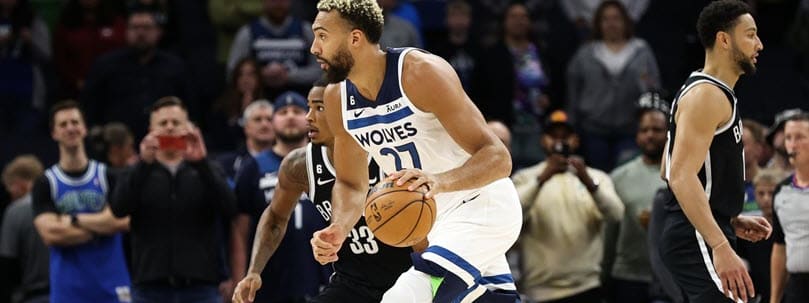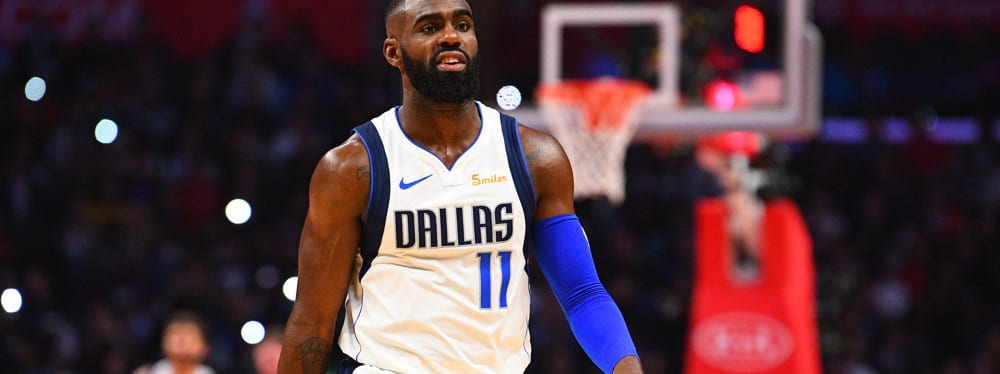Recent RotoWire Articles Featuring Terrence Ross
See More
Plain and simple, Ross was a disaster last season, finishing out as the 327th ranked player. Prior to 2021-22, Ross had been a viable 12-team asset, putting together a string of top-130 seasons. With the Magic starting to build up a nice young core, Ross' time as a viable fantasy option appears to have ended. To even sniff relevancy, he would need to play upwards of 28 minutes per night, which isn't in the cards. At this point, a trade might be the only thing capable of providing him with a role significant enough to at least be in the standard league discussion.
Injuries limited Ross to just 46 games last season, but he had a strong campaign when healthy. In 29.3 minutes per game, he averaged 15.6 points, 3.4 rebounds, 2.3 assists and 1.0 steals. The result was Ross finishing as the 120th-best fantasy player on a per-game basis -- his third straight season inside the top 125. At the trade deadline last season, the Magic began a full rebuild, sending off Nikola Vucevic to the Bulls. Now, Ross is one of the oldest players on the team at 30 years old. That complicates his role for 2021-22, as the priority for the organization is clearly developing young talent. As a guard/wing, Ross will be competing for playing time with a myriad of players, including rookie Jalen Suggs, Gary Harris, R.J. Hampton, Chuma Okeke and Jonathan Isaac (once he's healthy). There's still a pathway for Ross to see minutes in the mid-to-upper 20s and be a consistent threat for 20 points given his microwave-scorer abilities, but drafting Ross is riskier than in recent seasons due to the direction of the team. He's probably only a deep-league target, as he doesn't provide much upside but has a solid floor if he can see sixth-man minutes.
Ross hasn't started a game since November 2017, but that could change this season. Ross may be able to step into a starter's role, as Jonathan Isaac (knee) will be out all season and Al-Farouq Aminu (knee) won't be ready for the start of the year. That opens up small forward for Ross, who is likely to get the nod between Aaron Gordon and Evan Fournier. When seeing at least 30 minutes last season, Ross averaged 18.4 points, 3.6 rebounds, 3.3 threes, 1.3 assists and 1.1 steals. Those numbers might be a little ambitious for this season, but it demonstrates a best-case scenario for this season.
Ross is back with the Magic after inking a four-year, $50 million deal in the offseason. He finished third on Orlando with 15.2 points per game, shooting just 42.8 percent from the field but canning 38.8 percent of his threes. He made at least five three-pointers in 16 games, draining a career-high 2.7 per contest. Despite finishing the year with a quality three-point shooting percentage, Ross struggled with consistency scoring from game to game. He managed 21 games of 20 or more points but totaled 22 games scoring less than 10 points. Ross will compete for playing time with Jonathan Isaac, Evan Fournier and newly-acquired Al-Farouq Aminu this season, though he was still able to carve out 26.5 minutes per contest last season off the bench. He could maintain a 20-minute-per game-role this season, as he provides a scoring punch for the second unit. Ross is an excellent source of threes, three-point percentage and free-throw percentage, though fantasy owners should be prepared for some up-and-down stretches of play throughout the season.
Due to various leg injuries, Ross was limited to 24 games during his first full year with Orlando. The 27-year-old started 20 of those contests, averaging 9.3 points, 3.2 rebounds, 1.6 assists and 1.3 steals across 26.9 minutes in that role. He struggled with efficiency, shooting 39.8 percent from the field and 32.3 percent from three. However, it’s unlikely he was 100 percent healthy and the sample size was relatively small. From 2014-15 through 2016-17, he shot 42.5 percent from the field and hit 1.8 threes at 37.9 percent, claiming a 52.6 effective field-goal percentage. So, assuming he can remain healthy, Ross is a candidate for a bounce-back campaign. Minutes won't be easy to come by, though, as Jonathan Isaac (who played only 27 games due to a persistent ankle injury), Jonathon Simmons and Evan Fournier all remain on the roster.
Ross, a member of the Raptors for the first four years of his career, was dealt to the Magic at the trade deadline last year in the move that brought Serge Ibaka to Toronto. The move gave Ross a solid bump in playing time, jumping from 22.4 minutes per game up to 31.2 minutes per game as he became the starting small forward in Orlando for the second half of the season. He failed to step up his game within the new role, however, seeing his points per game rise from 10.4 with the Raptors up to just 12.5 with his new squad. Considering nearly all of Ross’ Fantasy value comes due to his ability as a scorer, the second half of 2016-17 was somewhat disconcerting. With the Magic, in addition to his 12.5 points, he provided only 2.8 rebounds, 1.8 assists and 1.4 steals per game while shooting a subpar 43.1 percent from the field and drilling 1.9 threes at a 34.1 percent clip. Orlando seemingly felt lukewarm about his production as well, as they drafted wing player Jonathan Issac while adding Jonathon Simmons and Arron Afflalo through free agency. When looking at Ross’ production with Orlando as well as their offseason additions, it seems safe to say his Fantasy value will likely take a downturn heading into the 2017-18 campaign.
One of the biggest disappointments for the Raptors last season, Ross' game seemed to regress across the board to the point that the third-year player was considered a likely candidate to get dealt heading into the draft, and he averaged 26 minutes, 9.8 points, 2.8 rebounds, 1.0 assist, 0.6 steals, 0.3 blocks, and 1.8 three-pointers in 82 games while shooting 41 percent from the floor, 37 percent from three-point range, and 79 percent from the free-throw line. An athletic wing who seems to have all the tools to at least be an effective 3-and-D player, he instead loses focus too often on the defensive end and seems unwilling to assert himself on offense, either in attacking the rim or as a shooter. With DeMarre Carroll signed to be the new starting small forward and Greivis Vasquez and Lou Williams in other uniforms though, Ross now looks to be one of the primary scoring threats off the bench as opposed to the forgotten man in the starting lineup, a role he could be more comfortable with. Memories of his 51-point night against the Clippers two Januarys ago are still fresh enough that Ross will get one more chance to prove himself in Toronto, but time is running out.
When Rudy Gay was dealt to Sacramento early last season, second-year wing Terrence Ross inherited the starting small forward spot and found some success, including a 51-point explosion against the Clippers in late January. Ross' overall numbers in 62 starts were solid for a player without a key role in the offense, as he averaged 12.2 points, 3.3 rebounds, 2.3 three-pointers, 1.1 assists, and 0.9 steals in 29 minutes per game, with shooting percentages of 43 percent from the field, 85 percent from the free-throw line, and 40 percent from beyond the arc. Even more will be expected from Ross this time around. He's got the elite athleticism and hops to be a force at both ends of the court, and with DeMar DeRozan's frequent visits to the free-throw line as a model, Ross should be able to start finding ways to attack the basket on a more consistent basis. The re-acquisition of James Johnson in the offseason could provide a threat to Ross' minutes, as Johnson offers a little more length on defense from the small forward spot, but barring a training camp disaster, Ross' starting spot at the three should be secure.
Ross' rookie season was predictably inconsistent, but his retro Vinsanity slam dunk contest win brought him plenty of attention anyway. He's a fantastic athlete with great hops and some feel for shooting from long range, but with Rudy Gay and DeMar DeRozan in firm control of the starting wing spots, Ross will remain a bench player for the foreseeable future. That role might be the best thing for his development though, and another year or two as a defense and sharpshooting specialist should allow him to hone his skill set and be ready to blossom once a starting spot opens up for him.
In a somewhat surprising move, the Raptors drafted the raw but talented Ross with the eighth overall pick in the 2012 NBA Draft. Ross entered the draft after his sophomore season at the University of Washington, where he averaged 16.4 points and 6.4 rebounds per game for the Huskies. Coming out of Washington, Ross was lauded for his defense, long-range shooting ability, and court vision, all traits that should endear him well to the Raptors coaching staff. How quickly those skills will translate to the next level remains the question for Ross, however. With DeMar DeRozan the incumbent starter at shooting guard and free agent signing Landry Fields likely inserted at the other wing position to start the season, Ross might have to settle for a bench role from the outset. On a positive note, Ross showed some definite promise in five summer league games, averaging 14.4 points and 3.6 rebounds in 27.2 minutes per game. Ross may struggle initially as he gains familiarity with the increased speed of the NBA, but as a building block for the team’s future, the Raptors will in all likelihood give him a trial run in the starting lineup at some point during the season.













